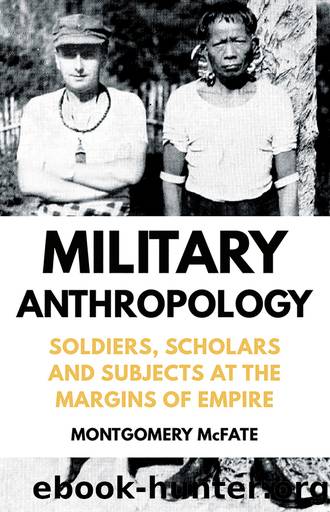Military Anthropology by McFate Montgomery;

Author:McFate, Montgomery;
Language: eng
Format: epub
Publisher: Oxford University Press, Incorporated
Published: 2018-11-15T00:00:00+00:00
Fantasy ideology of empire
In March 1952, His Excellency Sir Philip Mitchell, the colonial Governor of Kenya, took a fishing trip. On his visit to the central province, he saw âsmiling faces and happy cheerful people delighted to see one and to pass the time of day.â24 Meanwhile, the Mau Mauâapparently unbeknownst to Sir Philipâwere expanding their control over the Kikuyu population through an accelerated campaign of oathing and murder. Despite settler demands to declare a state of emergency, Sir Philip dismissed all reports concerning political unrest as alarmist, stating that the government had determined that the âKikuyu were an unwarlike tribe and could be crushed in a matter of a few weeks if they really started violence in earnest.â25 In March 1952, Sir Philip instructed his private secretary to notify the district commissioners that he would no longer read intelligence reports and requested that they should please desist from sending them. In Sir Philipâs mind there was nothing to be concerned about; the Mau Mau were just another local prophetic sect, the product of a culture of âa forest and mountain dwelling peopleâ who are âparticularly given to black and foul mysteries, to ritual murder, to ordeals by oath and poison and cults of terror, in which murder is the central feature.â26 Blinded by a fantasy of Kenya and the Kikuyu, the government did little as the security situation spiraled out of control.
As observed throughout this book, many barriers exist to the military execution of foreign policy, including complexity, limits to human knowledge, and time. During the Mau Mau Emergency in Kenya, both the settler community and the British colonial government suffered from a particular conceptual barrier, what Lee Harrisâin the context of Al Qaedaâhas identified as a âfantasy ideology.â27 In a 2002 essay, Harris argues that human beings, when confronted with something strange and seemingly inexplicable, will impose their own inadequate categories to explain it. Americans interpreted the 9â11 attacks, Harris writes, on the basis of deep unquestioned assumptions: âAn act of violence on the magnitude of 9â11 can only have been intended to further some kind of political objective.â28 On the contrary, argues Harris, the 9â11 attacks lacked a rational, instrumental Clausewitzian political objective. They were not designed to force the U.S. to alter its policy in the Arab world, nor were the targets chosen for their military importance. Rather, the twin towers of the World Trade Center were âgigantic props in a grandiose spectacle in which the collective fantasy of radical Islam was brought vividly to life: a mere handful of Muslims, men whose will was absolutely pure, as proven by their martyrdom, brought down the haughty towers erected by the Great Satan.â29
The British colonial government in Kenya held a fantasy ideology of the colonial enterprise in which Africans were merely âsmiling facesâ delighted to receive the benefits of civilization. Similarly, the white settlers had a collective fantasy of Africa,30 âbeautiful, open, sun-drenchedâa golden land that preserves ways of life now but a memory in Britainâa nostalgic fantasy that, born of a distaste for the present, glorifies the past.
Download
This site does not store any files on its server. We only index and link to content provided by other sites. Please contact the content providers to delete copyright contents if any and email us, we'll remove relevant links or contents immediately.
| Automotive | Engineering |
| Transportation |
Whiskies Galore by Ian Buxton(41525)
Introduction to Aircraft Design (Cambridge Aerospace Series) by John P. Fielding(32885)
Small Unmanned Fixed-wing Aircraft Design by Andrew J. Keane Andras Sobester James P. Scanlan & András Sóbester & James P. Scanlan(32570)
Craft Beer for the Homebrewer by Michael Agnew(17930)
Turbulence by E. J. Noyes(7697)
The Complete Stick Figure Physics Tutorials by Allen Sarah(7135)
Kaplan MCAT General Chemistry Review by Kaplan(6594)
The Thirst by Nesbo Jo(6432)
Bad Blood by John Carreyrou(6271)
Modelling of Convective Heat and Mass Transfer in Rotating Flows by Igor V. Shevchuk(6219)
Learning SQL by Alan Beaulieu(6032)
Weapons of Math Destruction by Cathy O'Neil(5825)
Man-made Catastrophes and Risk Information Concealment by Dmitry Chernov & Didier Sornette(5644)
Digital Minimalism by Cal Newport;(5388)
Life 3.0: Being Human in the Age of Artificial Intelligence by Tegmark Max(5182)
iGen by Jean M. Twenge(5158)
Secrets of Antigravity Propulsion: Tesla, UFOs, and Classified Aerospace Technology by Ph.D. Paul A. Laviolette(4984)
Design of Trajectory Optimization Approach for Space Maneuver Vehicle Skip Entry Problems by Runqi Chai & Al Savvaris & Antonios Tsourdos & Senchun Chai(4837)
Electronic Devices & Circuits by Jacob Millman & Christos C. Halkias(4744)
